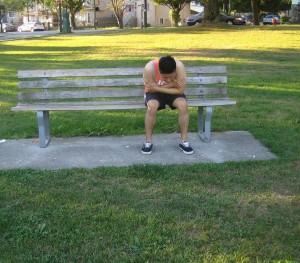Alcohol poisoning can occur among individuals who engage in excessive consumption of alcoholic beverages. It is important to note that the level of alcohol in the bloodstream of an individual continues to increase for up to 30-40 minutes after the last beverage ingested. This can cause the symptoms to become worse abruptly. It is vital to be well aware of the indications of alcohol poisoning.
Indications of alcohol poisoning
The indications that an individual might have alcohol poisoning include the following:
- Severely slurred speech
- Confusion
- Vomiting
- Loss of coordination
- Slow or erratic breathing
- Stupor (conscious but unresponsive)
- Hypothermia
- Passing out and loss of consciousness
What happens if an individual is poisoned by alcohol?
- Choking on vomit
- Cessation of breathing

You have to keep the individual in a seated position and awake. - Heart attack
- Inhalation of vomit that can lead to fatal lung damage
- Severe hypothermia
- Severe dehydration that can lead to permanent brain damage in severe cases
- Seizures or fits due to the abrupt drop in the blood sugar level
Take note that recurrent vomiting can result to vomiting of blood due to a torn blood vessel at the intersection of the stomach and esophagus. In severe cases, this type of poisoning can progress to coma, cause damage to the brain and even lead to death.
What are other possible risks?
Consumption of excessive alcohol can affect the judgement of an individual and put him/her at risk such as the following:
- Being involved in an accident or injury
- Involved in violent or antisocial behavior
- Loss of consciousness
Treatment
Those who have alcohol poisoning could not help themselves. When drinking, it is vital to be well aware of the signs and symptoms of alcohol poisoning and you should know what to do when someone drank too much.
What you can do
Once an individual is suspected with alcohol poisoning, you have to call for emergency assistance. While waiting for the emergency team to arrive, you have to consider the following:
- You have to keep the individual in a seated position and awake.
- Provide the individual with water if able to drink.
- If the individual passed out, allow him/her to lie on the side in the recovery position and check if breathing properly.
- Keep the individual warm.
- Always stay with the individual and closely monitor for any symptoms.
What NOT to do
There are a number of misconceptions that were used to help an individual sober up when drunk. Most of these are wrong and can be even dangerous such as the following:
- Do not provide coffee to the individual since it will further worsen dehydration
- Leave the individual alone on his/her back even if asleep
- Walk the individual around
- Allowing the individual to drink more alcohol
- Putting the individual under a cold shower
Hospital treatment
An individual suspected with alcohol poisoning requires hospital treatment. The individual is closely monitored until the alcohol has left the body and the following:
- Insertion of a tube to open up the airway, eliminate any blockages and assist with breathing.
- Start an intravenous drip that goes directly into the vein to boost the water, vitamin and blood sugar levels.
- Insertion of a catheter to the bladder to drain out the urine directly into a bag.
- Pump the stomach via the flushing of fluids using a tube that is inserted into the mouth or nose.

